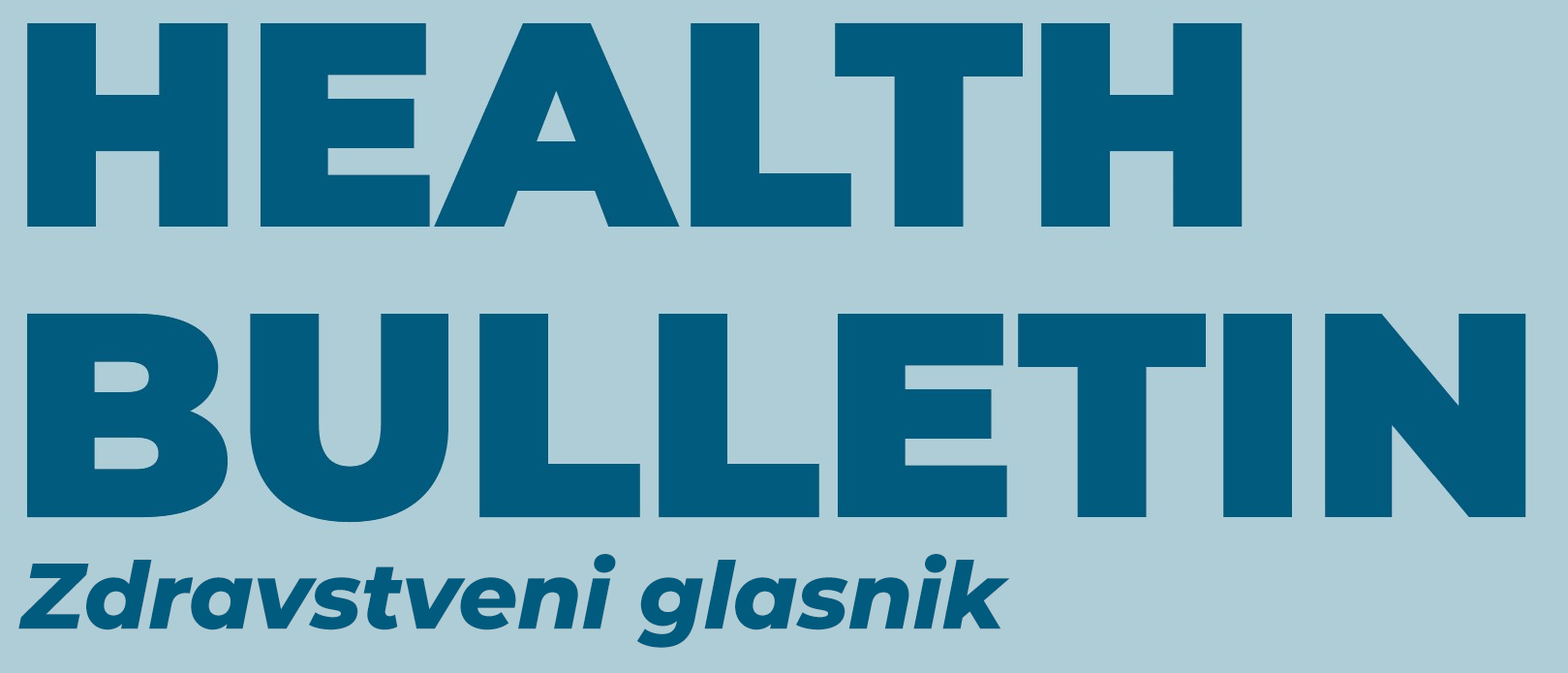Publication Ethics
STATEMENT ON PUBLISHING ETHICS AND CONSCIOUSNESS
The journal Health Bulletin is committed to maintaining high standards of ethical behavior in all aspects of editing and publishing. We follow guidelines for ethical expectations, violations of ethical standards, and measures against unethical behavior as outlined by the Committee on Publication Ethics (COPE), Elsevier Publishing Ethics Resource Kit (PERK) and International Committee of Medical Journal Editors (ICMJE) Recommendations for the Conduct, Reporting, Editing and Publication of Scholarly Work in Medical Journals. This ensures that the journal adheres to best practices in the industry and maintains integrity in the published content.
- Ethical expectations
- Responsibilities of editors-in-chief
Decisions to publish
- The editor-in-chief makes the final decision on acceptance/non-acceptance of the work for publication.
- In doing so, he follows the policy of the Editorial Board, as well as the applicable legal regulations on the protection of honor and reputation, copyright infringement and plagiarism.
- The editor may be guided by the opinion of reviewers and members of the Editorial Board for making the final decision on acceptance and publication of the work.
- The editor must provide a one-page blind review of all papers published in the journal.
- The editor-in-chief must encourage the responsible behavior of all participants in the process of publishing issues of the journal.
- In case of ethical complaints or conflicts, the editor will act in accordance with the rules of the journal and provide the authors with the opportunity to respond to all complaints. All complaints should be investigated regardless of when the original publication was approved for print. Documentation related to complaints should be preserved.
Impartiality
- Contributions are evaluated based on their content without discrimination based on race, gender, sexual orientation, religious beliefs, ethnic origin, citizenship or political philosophy of the author.
- Contributions to sponsored or thematic issues are evaluated according to the same criteria as other contributions. Such manuscripts are evaluated and accepted solely according to their academic value and quality, regardless of any financial conditions.
Data confidentiality and conflict of interest
- The editor and members of the Editorial Board may not disclose information about the received manuscript to anyone other than the author, reviewers, possible reviewers, assistant editors and, if necessary, the publisher.
- The editor and members of the Editorial Board must ensure the confidentiality of data or ideas obtained through reviews and prevent their misuse.
- The editor may not use unpublished materials from contributions to the journal in his own research paper without the express written consent of the author.
- In a special case, it is possible for the guest-editor of the thematic issue/block to be the author of the contribution in the section he edits. In such cases, the guest editors must inform the Editorial Board in advance in order to prevent a conflict of interest when evaluating and making a decision on the publication of their contributions. Guest-editors will in no way be involved in the process of reviewing and accepting their manuscripts, and one of the permanent members of the Editorial Board will take care of their manuscripts.
- Responsibilities of reviewers
Contribution to the decision of the Editorial Board
- A single blind review is conducted.
- The review is carried out objectively. Personal criticism of the author is inappropriate.
- Reviewers should conduct reviews objectively and express their views with arguments.
Confidentiality
- Reviewers should take care of the confidentiality of the review process and all data provided to them by the editor or author.
- Any manuscript received for review is considered a confidential document, which is why it must not be shown to others without the editor's permission.
- Copies of the manuscript may not be kept by the reviewer after the review process has been completed.
Reference to sources
- Reviewers should recognize and alert the editor to any relevant published or submitted content that is substantially similar or overlaps with the content of the reviewed manuscript, and which the authors have not cited as a source. For each statement, observation, or argument cited above, the appropriate source must be cited.
Data disclosure and conflict of interest
- Information or ideas obtained through peer review are confidential and may not be used for personal purposes. Reviewers may not consider manuscripts for which they have a conflict of interest (financial, institutional, collaborative or other relationship between the reviewer and the author, i.e. the work submitted to them for review).
- Responsibilities of Authors
Standards for formatting work and presentation of data
- Authors of scientific papers must accurately and objectively present the results and scientific contribution of their work.
- The information provided in the paper must be correct.
- The work must be detailed and supported by appropriate literature.
- False or knowingly inaccurate statements are unethical behavior and are unacceptable.
Data access and retention
- Authors are required to present in their work original data obtained through research.
- Authors should be ready to provide public access to such data in accordance with the ALPSP-STM Statement on Data and Databases (ALPSP-STM Statement on Data and Databases), if possible, and should in any case be ready within a certain period preserve such data after publication.
Originality and plagiarism
- Authors must guarantee that their work is completely original and that it strictly follows the rules of scientific methodology. If they used someone else's work or words, they must cite them in an appropriate way.
- Submitting a manuscript for publication is equivalent to a "Declaration of Authorship and Copyright" according to the Law on Copyright and Related Rights (Official Gazette 167/03). The author thereby guarantees that the submitted work represents his original manuscript and that it has not been previously published or is under consideration for publication in another publication.
- With the aim of ensuring the highest ethical and academic quality standards of scientific works, the originality of the content of all manuscripts considered for publication in the Health Gazette is subject to verification. By submitting a manuscript to the journal, the author accepts all necessary checks of originality that the manuscript will have to undergo during the evaluation or publication process.
Copyright
- Authors should confirm that the submitted manuscript does not violate copyright rules.
- If necessary, authors should obtain permission from the authors whose research they are using to reproduce any content from other sources. The journal Zdravstveni glasnik is not responsible for violations of the right to cite the author. Any violation of copyright laws will result in the rejection of the submitted material or its withdrawal after publication. Furthermore, the submitted manuscript must not contain any defamatory, derogatory, obscene or illegal material.
Multiple posting of the same material
- Authors should not publish manuscripts in which they conduct substantially the same research in more than one journal or primary publication. Submitting the same manuscript to more than one journal simultaneously represents unethical behavior in publishing and is unacceptable.
Reference to sources
- It is always necessary to cite the sources in an appropriate way and indicate the authors to whom the work refers.
Authorship of the work
- The authorship of the work must be accurately stated. Submitting a manuscript for publication implies that all individuals listed as authors really participated in the creation of the work and that they all gave consent for its publication.
Dangers to people and animals
- If the work involves the use of chemicals and procedures or equipment the use of which is dangerous, the author must clearly highlight this in the manuscript and must take care that any research involving humans or animals complies with national, local and institutional laws and regulations (e.g. WMA declaration from Helsinki, NIH policy on the use of laboratory animals, EU Directive on the use of animals) and, if necessary, submit a certificate of research approval.
- Authors should request express permission for research conducted on human subjects and respect their privacy.
Disclosure of information and conflict of interest
- Authors are obliged to ensure that there are no potential conflicts of interest in their work that could affect the results or interpretation of the research, for example if there is a competing interest that could influence the author at any stage during the publication process.
- All sources of financial support for the project should be listed.
Significant errors in published works
- If the author discovers a significant error or inaccuracy in his own published work, it is his obligation to immediately inform the editor of the journal or the publisher and to cooperate with the editor in order to publish an erratum, addition or correction, or to withdraw the work from publication in cases where this is necessary .
For more information on author responsibility, please visit the COPE International site
- Action measures against unethical behavior
Recognizing unethical behavior
- Anyone at any time can point out inappropriate and unethical behavior and warn the editor and publisher about it.
- Anyone who reports such behavior to the editor or publisher should provide sufficient information and evidence to initiate an investigation. All allegations will be taken and treated seriously and impartially until the matter is resolved.
Investigation
- The decision to initiate an investigation into unethical behavior is made by the editor, if necessary in agreement with the publisher.
- In the case of an investigation, evidence is collected, avoiding the dissemination of information outside the circle of people who are part of the investigation.
Minor offenses
- Minor offenses can be solved in a summary procedure, without the involvement of higher instances. In any case, the author should be given an opportunity to respond to any allegations.
Serious violations of the code of ethics
- Sanctioning serious forms of misconduct may include notifying the employer of the person accused of misconduct. In agreement with the publisher or competent institutions, the editor will, if necessary, make a decision on including or not including the employer in the procedure, either by independent inspection of the available evidence or further consultation with a certain number of experts. Measures (from milder to stricter; they can be applied separately or in combination)
- Informing or educating authors or reviewers in cases of misunderstanding or failure to apply acceptable standards.
- Contacting the author or reviewer in writing in order to point out illegal behavior and issue a warning.
- Publication of an official notification indicating inappropriate behavior.
- Publishing editorials detailing misconduct.
- A formal letter to the head of the department or company funding the author or reviewer.
- Formal withdrawal of the publication from the journal and informing the head of the department where the author or reviewer is employed, the storage service and the readership of the publication.
- Introducing a formal embargo on the contributions of the individual in question for a certain period of time.
- Informing competent institutions about the case in question and its outcome with the aim of further investigation and action.














